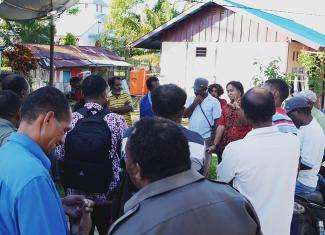Last week in our COP21 article series, we highlighted how Ghana is strengthening local forest governance by bridging efforts to reduce emissions from deforestation and forest degradation (REDD+) with the country's already-established Community Resource Management Areas (CREMAs). On the same theme, Indonesia is also providing examples of how REDD+ and existing initiatives can work hand-in-hand to bolster the engagement of local communities in forest management.
Since beginning action on REDD+, developing countries have discovered that existing local strategies to empower communities in forest resource management are providing an ideal entry point for many aspects of REDD+ implementation, including clarifying tenure rights to address equitable benefit sharing. In turn, linking REDD+ to these existing initiatives is opening up new streams of potential benefits for local communities and helping to ensure the long-term success of efforts to foster natural resource democracy.
Indonesia's Forest Management Units
Similar to Ghana's CREMAs, Indonesia has set up Forest Management Units (FMUs) that function as decentralized entities charged with planning, management, investment, and monitoring and evaluation of forests under their authority. FMUs, as the managers of government institutions at the local level, are granted an initial financial allocation to cover set-up costs but are expected to generate sufficient income to be self-sustaining. They are also designed to oversee licensing and resolve conflicts in forest management, and offer a tenure arrangement while enhancing the value and benefits of forests to local communities, local government and the State.
Indonesia's Ministry of Environment and Forestry has made FMUs a key priority. The country's newly developed national strategic plan has set a target of creating 600 new FMUs by the end of 2019. West Papua province plans to develop 22 FMUs representing 57% (5.4 million hectares) of the province's forest. Papua province is aiming to set up 56 FMUs representing about 59% (18.2 million hectares) of forest in the province.
Backed by this high-level, long-term commitment, FMUs are providing a well-established starting point for discussions on integrating local rights, equitable REDD+ benefit sharing and other aspects of REDD+ implementation. In turn, REDD+ projects that include securing forests against legal conversion, managing or reducing commercial logging, and planting trees in degraded forests can help FMUs limit carbon emissions and achieve their overarching sustainable forest management goals.
FMUs have been praised as an innovative and comprehensive framework for clarifying and securing community rights, optimising the value of forests, creating community forest management partnerships, and supporting sustainable economic development, biodiversity conservation, and climate change mitigation. However, they do face several key challenges moving forward.
Historically, the government has given concessions to private sector projects because they have been able to deliver very rapid income in the provinces. FMUs will need to find a way of successfully competing with these private investment initiatives that is inclusive of local forest management institutions for future concessions. FMUs will also need to prove their economic viability and comparative advantage, especially to central and provincial level governments that remain focused on extractive models of development. FMUs can also show the pathway for participatory, inclusive forest governance models that should be able to reduce existing conflicts.
REDD+ and other livelihood-enhancing forest management approaches, such as payments for ecosystem services (PES), hold the potential to increase the economic and livelihood value of forests beyond logging. Enhancing PES and REDD+ initiatives can help FMUs to play a role in shifting Indonesia's economy away from extractive forestry approaches.
Indonesia's customary boundaries maps
Indonesia's National REDD+ strategy and action plan has identified the need to clarify local land tenure and forest rights to ensure REDD+ efforts benefit indigenous peoples and local communities. Maps that identify customary boundaries and ownership of land - especially those made in a participatory way - are proving essential tools for land and resource planning, resolving disputes, and educating community rights to younger generations. They are also invaluable tools for setting up REDD+ benefit sharing and related PES arrangements in the country.
In Papua Province, 24 communities now have customary boundary maps that cover about two million hectares. One notable success is in the highlands of Wamena, where the local government took a lead role in the mapping process and has planned to integrate the customary boundaries maps into its long-term forest management plan of the newly formed FMU. Wamena based groups have also advanced their land use and forest management plan, which will easily integrate with the FMU's business plan.
For REDD+ projects, these customary boundaries maps can be a tool to learn who has what rights and where. The maps can also catalyse discussions on how the community's current activities affect the forest and what changes could be made to reduce emissions and protect and enhance carbon stocks.
The creation of more customary boundaries maps faces several challenges. There is a lack of reliable conflict resolution mechanisms for handling latent boundary conflicts between neighbouring communities, although these conflicts can usually be resolved using trusted local mediators. And there is a tendency for the government to use these conflicts as justification to invest less in mapping initiatives. There are also gaps in technical capacity building needed to produce new maps and improve existing ones. Additional challenges lie in the lengthy application of new regulations for legal recognition, and the difficulty in developing joint forest management and land-use plans with relevant government agencies to accommodate customary use.
Despite these challenges, IUCN and the Samdhana Institute in Papua and West Papua Provinces continue to support the development of maps in new customary areas. Work is being done to get maps formally recognised and used by national and subnational governments as central tools in inclusive sustainable forest and land management. These maps will also form the basis of customary boundary management plans based on cultural zones, as well as in the design of agroforestry and reforestation activities in degraded areas consistent with REDD+ implementation plans.




